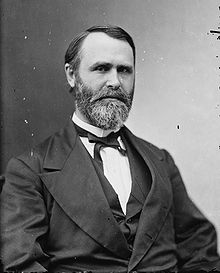Jacob Dolson Cox
Jacob Dolson Cox junior (* 27. October 1828 in Montreal , Canada ; † 4. August 1900 in Gloucester , Massachusetts ) was an American politician of the Republican Party , 1866-1868 Governor of Ohio and from 1869 to 1870 Minister of the Interior of the United States . He also served as a general in the US Army during the American Civil War .
Early years
Cox was born in Montreal to Jacob Dolson Cox senior and Thedia Redelia Kenyon Fox. His father, a well-known building contractor from New York , lived with his wife temporarily in Montreal to supervise the construction of a church there. The family moved back to New York a year after Cox was born. Among other things, the parents employed a student as a private teacher for his training. He began his practical training at the age of 14 as an office clerk in his father's shop. Two years later, he started working for a brokerage firm to train in accounting. Under the influence of his very religious parents, he then decided to become a clergyman. to let. For this purpose he enrolled at Oberlin College , which was directed by the revival preacher Charles Grandison Finney . It was here that Cox developed a bond with his training facility that would last until his death.
In Oberlin , 19-year-old Cox married the widowed Hellen Clarissa Finney, the eldest daughter of Charles Grandison Finney, who already had a young son from her first marriage. The couple initially lived with Cox's father-in-law, but Cox and Finney soon became estranged due to differing theological views. In 1850 he graduated from Oberlin College and began working as a school inspector in Warren . He also studied law and was admitted to the bar in 1853. As a strict abolitionist , he helped build the Republican Party in Ohio in 1855 and campaigned for the Republican candidates in the counties in the Warren area. In 1860, Cox himself was elected to the Ohio Senate, where he soon developed close ties to the later US President James A. Garfield and the Governor of Ohio, Salmon P. Chase . While still serving in the State Senate, Cox accepted an appointment as Brigadier General of the Ohio Militia and spent most of the winter of 1860-61 privately studying military textbooks. On April 23, 1861, a few weeks after the attack on Fort Sumter and the start of the civil war, Cox began his service with the militia. Just a month later he was promoted to Brigadier General of the Army Volunteers.
In the Civil War
At the beginning of the Civil War, Cox, who had meanwhile been a father of six, was not in good health. As the first command as brigadier general of the volunteers, he was therefore given the command of a troop training camp near Columbus . He later took over the so-called Kanawha Brigade in the Department of the Ohio . Soon after, the brigade was assigned to the Department of Western Virginia and Cox successfully participated with her in the Kanawhatal campaign under Major General George B. McClellan . In 1862 the brigade was transferred to Washington, DC and assigned to the Army of Virginia , commanded by John Pope . However, she was not involved in Pope's defeat in the Second Battle of the Bull Run . As a result, Cox and his brigade were assigned to the IX. Affiliated with the Army of the Potomac Corps and participated in the Maryland campaign . When Commanding General Maj. Gen. Jesse L. Reno was killed in the Battle of South Mountain , Cox took command of the IX. Corps. He asked Major General Ambrose Burnside , who commanded a two-corps wing of the army , to give him command of only one division , believing that his military skills were insufficient to command a corps. Burnside did not comply with Cox's request, but kept him under surveillance. For the bad performance of the Burnside-controlled troops in the Battle of Antietam , however, Cox was not responsible.
After the Battle of Antietam, Cox was promoted to major general on October 6, 1862, but that promotion did not go into effect. It was not confirmed by the Senate because there were already enough officers with the appropriate rank. Eventually, on December 7, 1864, Cox was promoted. In 1863, Cox was stationed primarily in the safe hinterland of Ohio and Michigan .
In 1864 and 1865, Cox took over as commander of the XXIII. Army of the Ohio Corps under Maj. Gen. John M. Schofield participated in the Atlanta Campaign , the Franklin-Nashville Campaign, and the Carolina Campaign . At the Battle of Franklin in November 1864, Cox excelled when his subordinate troops saved the center of the Union lines. In the last days of the war he was in command of the XXIII. Corps in North Carolina .
Governor of ohio
Even before Cox was discharged from the army on January 1, 1866, he had been elected governor of Ohio. He held this office until 1867. Because of his liberal views on the issue of African American franchise and his approving stance on President Andrew Johnson's reintegration program for the defeated southern states, Cox was no longer run as a gubernatorial candidate by the Ohio Republicans in 1867. After retiring, Cox worked as a lawyer in Cincinnati .
United States Secretary of the Interior
In March 1869, Cox was appointed by the new President Ulysses S. Grant as Minister of the Interior in his cabinet . In this office he campaigned for a reform of the public service and implemented a system according to which public offices should only be awarded according to the performance principle. However, Cox resigned as early as November 1870 when Grant failed to defend him against attacks by politicians who had taken advantage of the corrupt and nepotism-based system previously prevailing in the Home Office. Grant later commented on this resignation as follows: "The problem was that Cox believed the Home Office was the entire government and he was the Home Office."
In 1870 he was elected a member of the American Philosophical Society .
Last years
In 1872, Cox ran again in Ohio for his party's nomination for the US Senate, but the latter chose a less conservative candidate. From 1873 to 1878 he was president and liquidator of a railway company. In 1876 he was elected as a member of the Liberal Republican Party in Toledo to represent Ohio in the United States House of Representatives. At the end of his tenure in 1879, Cox declined a new nomination. He moved back to Cincinnati and served there from 1881 to 1897 as dean of the Cincinnati Law School and from 1885 to 1889 as president of the University of Cincinnati . After finishing his work as dean, Cox was offered the post of US ambassador to Spain by President William McKinley , but he declined.
In the last few years of his life, Cox was a prolific writer. Among his works are Atlanta (published 1882), The March to the Sea: Franklin and Nashville (1882), The Second Battle of Bull Run (1882), The Battle of Franklin, Tennessee (1897), and Military Reminiscences of the Civil War (1900).
Cox died on August 4, 1900 while on summer vacation in Gloucester, Massachusetts. He was buried in Spring Grove Cemetery , Cincinnati.
swell
- John H. Eicher, David J. Eicher: Civil War High Commands. Stanford University Press, 2001, ISBN 0-8047-3641-3 .
- Ezra J. Warner: Generals in Blue: Lives of the Union Commanders. Louisiana State University Press, 1964, ISBN 0-8071-0822-7 .
- Biography at the Ohio Historical Society
Web links
- Oberlin Alumni Association article on Finney's children (English)
- Cox's article on Antietam in Battles and Leaders (English)
- Jacob Cox in the Ohio History Connection Archives
- Jacob Dolson Cox in the Biographical Directory of the United States Congress (English)
- Jacob Cox in the National Governors Association (English)
- Jacob Dolson Cox in the Miller Center of Public Affairs of the University of Virginia (English)
- Jacob Dolson Cox in the database of Find a Grave (English)
Individual evidence
- ^ Member History: Jacob D. Cox. American Philosophical Society, accessed June 29, 2018 .
| personal data | |
|---|---|
| SURNAME | Cox, Jacob Dolson |
| ALTERNATIVE NAMES | Jacob Dolson Cox Junior |
| BRIEF DESCRIPTION | US Secretary of the Interior and Governor of Ohio |
| DATE OF BIRTH | October 27, 1828 |
| PLACE OF BIRTH | Montreal , Canada |
| DATE OF DEATH | 4th August 1900 |
| Place of death | Gloucester , Massachusetts |



